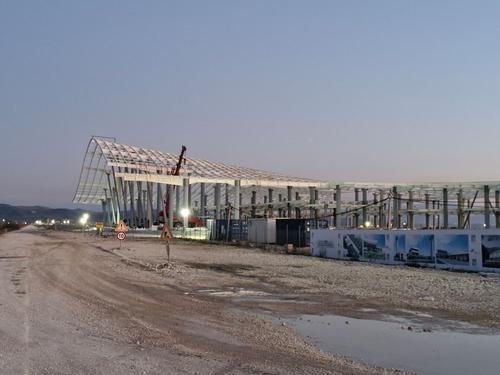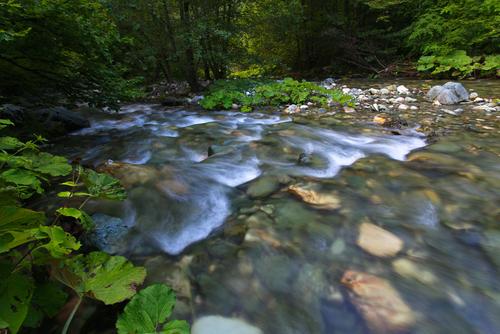++ Western Balkan candidates are still failing to meet EU nature and biodiversity safeguards ++ European Commission’s Enlargement Package notes serious shortfalls especially in protected-area safeguards, species conservation and environmental impact assessments ++

At the Vlora airport construction site, work is being carried out day and night.
© Annette Spangenberg/ EuroNatur
Natural rivers in Mavrovo National Park: the Radika...
© Goran SafarekBrussels, Radolfzell. The European Union has been a promised land for the Western Balkans for the last 20 years, and the EU Commission is pushing to deliver on its promise, in particular with countries of Albania and Montenegro. These new developments are welcomed, but tangible actions from the countries are needed to fill in gaps related to EU law. The EU Commission’s frontrunners are considerably behind, and Albania and Montenegro exemplify the gap between EU rhetoric and reality.
For example, the recent amendments to its Protected Areas law in Albania and the rapid construction of the Vlora airport in the Vjose-Narte Protected Landscape are explicitly cited as setbacks. The EU report assesses that this has led to the deterioration of nature protection in Albania and urges full alignment and enforcement of the Birds and Habitats Directives. It stresses the need for complete implementation of Environmental Impact Assessment (EIA) and Strategic Environmental Assessment (SEA) rules, ensuring all infrastructure investments comply with EU and international nature obligations, and restoring meaningful public participation. The Commission’s report nevertheless misses the opportunity to put these findings into the context of obligations vis-à-vis closing benchmarks for Chapter 27, as part of the EU Common Position on Cluster 4: Green agenda and sustainable connectivity.
“Pending”: a key word for Montenegro in the report. Some crucial legislation and their effective implementation thereafter are still pending; this is specifically related to the Law on Nature Protection and the National Strategy for Biodiversity. The hurdles related to ownership and obligations between the central and local authorities, has left Salina Ulcinj, one of the key biodiversity areas in the region, yet again without a plan for management.
Montenegro portrays itself as an “ecological state” and has made progress in mapping its biodiversity, yet the country faces significant shortcomings in protecting nature on the ground. Currently, less than 14% of Montenegro’s land and under 2% of its marine waters are protected areas, far below the Kunmin-Montreal target of 30%. A key issue is the failure to translate scientific assessments into legal protections, although over 70% of Montenegro’s territory has been identified for the Natura 2000 ecological network, the government has not formally designated these sites as required under the Emerald Network (Bern Convention). What happens currently is rather the opposite, as the new national spatial plan widely ignores candidate Emerald sites. This leaves many ecologically critical areas without effective safeguards, exposing them to increasing development pressures.
Critical gaps across Western Balkans
Across the region, the picture is similar, namely Bosnia and Herzegovina still lacks a Natura 2000 network or biodiversity monitoring system. In Kosovo, administrative capacity for environment remains “critically low” and protected areas lack proper management. The Commission specifically urges Kosovo to take “appropriate measures for the de facto prevention of pollution of protected areas and the management of protected areas”.
Serbia’s environmental legal framework is relatively well aligned with the EU on paper, for example, updated laws on EIA and SEA were passed in late 2024. But implementation is lagging. The Commission stresses that these laws now need to be applied swiftly and uniformly to all projects. In practice, Serbia has sometimes circumvented full EIA procedures by issuing preliminary approvals or using old studies to rush projects, sidelining thorough review and public input. Public participation in environmental decision-making remains inadequate, no improvement was seen in 2025 in transparency or consultations. Civil society reports that authorities often do not proactively disclose information on ongoing projects’ environmental impacts.
In North Macedonia, the EU Commission points out that the national information system for biodiversity is still not functional, and identifying potential Natura 2000 sites faces institutional difficulties. The process of declaring protected areas of high importance such as Lake Ohrid, Studenchisko Blato, Matka Canyon and the re-proclamation of the Mavrovo National Park, is still not finalised and may further deteriorate the biodiversity and natural values of the sites.
Overall, the environmental compliance is a weak link: all Balkan candidates have been told that accession progress hinges on demonstrable results on nature protection and the fight against environmental crime.
Gabriel Schwaderer, EuroNatur’s Executive Director states: “Governments and EU institutions must treat these findings as red flags, not mere formalities. In Albania, legislators should repeal the harmful amendments to the Protected Areas law in 2024, removing the carve-outs for irrigation, tourist resorts and infrastructure that undermine the values and the integrity of the protected areas. Major projects like the Vlora airport must be paused and reassessed with a proper EIA/SEA and genuine public review.”
Viktor Berishaj, Senior Policy Officer at EuroNatur concludes: “All Western Balkan countries must fully transpose the Birds and Habitats Directives, complete their Emerald/Natura 2000 networks and step up enforcement of wildlife laws. Access to information and justice under the Aarhus Convention must be guaranteed so that citizens can monitor decisions and challenge illegal projects. Above all, the EU should uphold Chapter 27 as a non-negotiable accession criterion: A country that fails to protect its rivers, forests and wildlife cannot credibly claim readiness to join the EU.”
Background information: Western Balkans is a region consisting of Albania, Bosnia and Herzegovina, Kosovo, Montenegro, North Macedonia and Serbia. They aspire to becoming Member States of the European Union, as does Ukraine, Georgia and Moldova. Due to this, they are also referred to as Enlargement Countries.
Press contact: Christian Stielow, Phone: +49 7732 9272 15, Email: christian.stielow(at)euronatur.org


